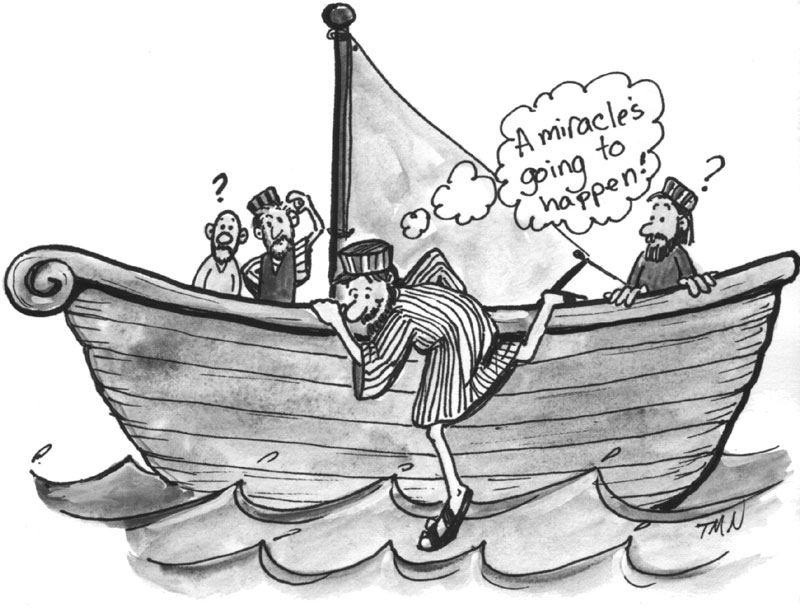 Here’s an email we received: “The surgery was a disaster. My husband had a brain hemorrhage and stroke in recovery. He was in ICU for 9 days. His brain is slowly waking up. It probably will be a recovery that takes several weeks/months. Thanks for praying for us—we have needed it!” After reading this email we didn’t know specifically how to pray for our friend. What do we do when we don’t know what to ask?
Here’s an email we received: “The surgery was a disaster. My husband had a brain hemorrhage and stroke in recovery. He was in ICU for 9 days. His brain is slowly waking up. It probably will be a recovery that takes several weeks/months. Thanks for praying for us—we have needed it!” After reading this email we didn’t know specifically how to pray for our friend. What do we do when we don’t know what to ask?
First, Don’t Rely Exclusively On Your Human Intellect
Proverbs 3:5 directs us to trust in the Lord with all our heart and lean not on our own understanding. Therefore, instead of feeling inadequate to help our friend in Dallas, we obeyed Proverbs 3:5.
Dee and I deliberately chose to speak from our human spirits. We uttered words and languages beyond the limits of our human intellect. The Bible calls speaking from the human spirit “tongues”. The early followers of Jesus “were filled with the Holy Spirit and began to speak in other tongues as the Spirit enabled them.” (1)
Our English word “tongues” simply means “languages.” Acts 2:4 shows human spirits empowered by the Holy Spirit to speak forth languages unknown to the speaker’s mind. What’s the purpose of such activity?
Tongues enables us to act in complete harmony with the God who knows everything. We serve as team members with the Holy Spirit in praying for others. Choosing to speak sounds our minds don’t understand is an act of faith that God honors. Therefore, on the day Dee and I received news of our friend’s medical plight, we exerted our human spirit’s ability to speak. The Holy Spirit provided the language for us to plead for his recovery.
The apostle Paul put it this way: “For if I pray in a tongue, my spirit prays, but my mind is unfruitful.”(2) There it is! Tongues originates in the human spirit, not the human intellect. Tongues is a combination language. The Holy Spirit provides the language and vocabulary; we provide the human spirit. Together these two spirits employ our body’s speech mechanism to utter requests based on the Holy Spirit’s infinite understanding.
After reading the report about our friend’s struggle, Delores and I quietly prayed in English. Then we switched to speaking languages supplied by the precious Holy Spirit. Our human spirits and the Holy Spirit worked in concert in praying for him.
Second, Be the Holy Spirit’s Reliable Partner
Yes, Delores and I purposefully chose to switch from speaking with our minds to speaking from our spirits. We want to be partners the Holy Spirit can rely on to work shoulder to shoulder with him in interceding for people’s needs. We aim to serve God with our spirits as well as with our minds. For example, 1 Corinthians 14:15 plainly states that Paul deliberately chose to speak from both his spirit and his mind. “I will pray with my spirit, but I will also pray with my mind.”
As a youth and young adult I could utter lots of prayers and requests in the language lodged in my brain. On the other hand, speaking from my spirit was pretty much stifled by my confusion about tongues.
I failed to distinguish between the private and public use of tongues. Fortunately, several years ago I noticed 1 Corinthians 14:18-19: “I thank God that I speak in tongues more than all of you. But in the church I would rather speak five intelligible words to instruct others than ten thousand words in a tongue.”
Paul felt thankful that he often spoke to God from his spirit. In private sessions with the Lord, Paul expressed his love for God fluently from his spirit. These private sessions, of course, included intercession in behalf of others.
Additionally, I failed to understand that we control whether or not we speak from our spirits. When using our minds we choose to either speak or remain silent. Well, for some reason I associated speaking in tongues with an emotional rush. When I didn’t feel the Holy Spirit’s presence, I didn’t speak in tongues no matter how great the need I wanted to pray about. I didn’t realize I was the Holy Spirit’s partner; I considered myself merely an inactive instrument that needed a supernatural touch to arouse my spirit to speak. This unscriptural belief effectively silenced my spirit’s ability to make requests that originated in the Holy Spirit’s infinite intellect.
A time came when I compared my human belief with Scripture. Guess what? I could find no scripture that supported my dependence on emotion, feelings or inspiration before speaking from my spirit. Subsequently, I came across 1 Corinthians 14:32: “The spirits of prophets are subject to the control of prophets.” There’s that word “control” again! From that day onward I began deliberately speaking to God from my spirit just like I had always chosen to speak to him from my mind. I controlled both my mind and my human spirit.
United Abilities
Peter asked for Jesus’ ability to walk on water. Jesus responded, “Come.” Consequently, Peter “Got down out of the boat, walked on the water…toward Jesus.” (3) This short story illustrates the awesome power of uniting God’s abilities with our capabilities. Peter could have set in the boat all day and asked Jesus to lift him up and put him on water. But God never works that way. He made us to work with us, not work without us. So dear Christian friends, let me urge you to follow the New Testament example. Use both your human mind and human spirit when making requests of God. Then you can move mountains!
Footnotes:
1. Acts 2:4
2. 1 Corinthians 14:14
3. Matthew 14: 28-29
If you would like to learn more on using your prayer language please check out my book entitled “Leaving Prayer, Entering Communion.”  You can order your copy by clicking here
You can order your copy by clicking here

